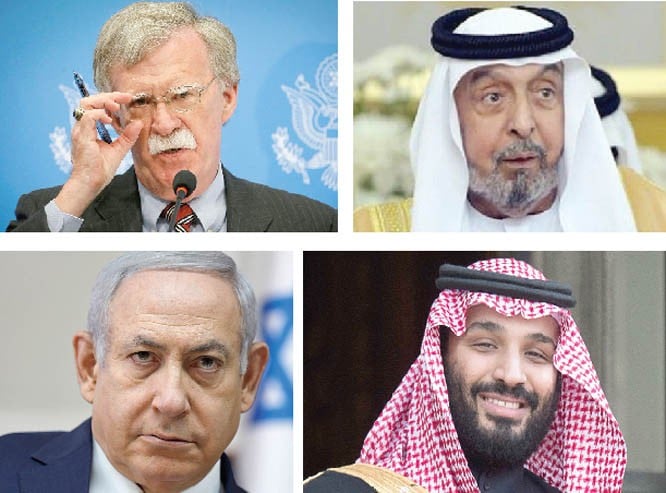
With US-Iran relations on the brink again, what will be the role of China and Russia in de-escalating tensions?

For now, almost every other member of the US Congress is not fully convinced about a military engagement with Iran. They have a one-word answer on the issue: No.
For now, even President Trump is restraining himself from declaring a major all out war with Iran. It’s significant since he had called out the Iranian President in his tweet last year, saying Iran "would suffer consequences the likes of which few throughout history have ever suffered before".
Trump’s posture might seem less threatening compared to his advisers. But, "that’s why presidential whisperers such as national security advisor John Bolton and Secretary of State Mike Pompeo are taking the small steps that could eventually lead, not by accident, to war with Iran," as Senator Chris Murphy and Congressman Jim Himes observed in the USA Today on May 14.
For now, the American people would also not support a pre-emptive attack on Iran but, as Murphy and Himes argue, "they might support retaliation if a nervous Iranian sailor points a weapon at nearby American naval forces".
The small steps that the Trump team is taking are based on the president’s personal preferences. He dislikes the Iran deal because Barack Obama negotiated it, David Sanger of The New York Times said in his video blog. The deal also does not last as long as Trump would like it to; and does not cover as many components as it should. The two main components being Iran’s ballistic missile programme and its support to proxies in the region.
As a candidate for the presidency, Donald Trump in March 2016 announced that Iran might not violate the deal because it can advance its nuclear ambitions while keeping billions of dollars from the US. "Yes, it places limits on its military nuclear program for only a certain number of years but when restrictions expire Iran will have industrial size military nuclear capability ready to go," he had said.
Since then, Trump has desperately wanted to cancel the deal and renegotiate with Iran. The Iranian leadership on the other hand has rightly wondered if a new deal would last long enough or would be scarped away again by any new administration.
For now, the four permanent members of the United Nations Security Council and Germany are still abiding by the deal, limiting the US administration’s ability to build international pressure against Iran. However, Trump has amassed Iran’s regional enemies.
Iran is convinced that the US is itching for a confrontation not just because of the nuclear deal but also due to what it calls "the B-team" that is determined to force a regime change in Iran. The B-team of course is an amalgam of the US National Security Advisor John Bolton, Israeli Prime Minister Benjamin Netanyahu (Bibi), Saudi King Mohammed Bin Salman and UAE President Sheikh Khalifa Bin Zayed Al Nahyan.
In an attempt to choke Iran’s economy further, Trump reimposed sanctions against Iran that targeted its critical sectors of energy, shipping and financial institutions.
In April this year, the White House labelled Iran’s Islamic Revolutionary Guard Corps a foreign terrorist group. The decision theoretically gives it some legal cover to declare war in the event of any suspected activities threatening the US or its allies in the region.
To impose maximum pressure, "until its leaders change their behavior," the US also dispatched an aircraft carrier strike group and bombers to the Middle East last month. Iran’s regional enemies were right behind these decisions. The UAE and Saudi Arabia committed to ensure supplies would be made available to replace all Iranian oil removed from the market.
So far, Iran has not changed its position. "The nuclear deal has not produced any positive outcome," said Iran’s Foreign Minister Jawad Zareef. He has also shared possible plans, on various occasions, contemplating to pull out of the Joint Comprehensive Plan of Action or even the Nuclear Non-Proliferation Treaty.
The withdrawal or a decision to enrich uranium at a faster pace could easily trigger the B-team to respond with military action. "It is not a crisis yet, but it is a dangerous situation. Accidents… are possible. I would not discount the B-team plotting an accident anywhere in the region, particularly as we get closer to the elections," Zareef explained to his audience in New York in April.
"All of this puts the conflict between the US and Iran on a hair trigger. And it gives extremists, including independent actors, the ability to try to provoke a US-Iran war by, say, assassinating a US military officer or firing rockets into an American compound -- even if Tehran has nothing to do with it," writes Bob Dreyfuss, an independent investigative journalist who specialises in the US national security.
He believes that Iran is trying to avoid to give Trump "the pretext it may be seeking to escalate the conflict", and to get around the sanctions Iran is likely to draw closer to China and Russia.
For now, the obvious question is how China or Russia, the two US adversaries, while keeping their own interests supreme, will advise Iran to act against any possible escalation. Or for that matter, de-escalation.